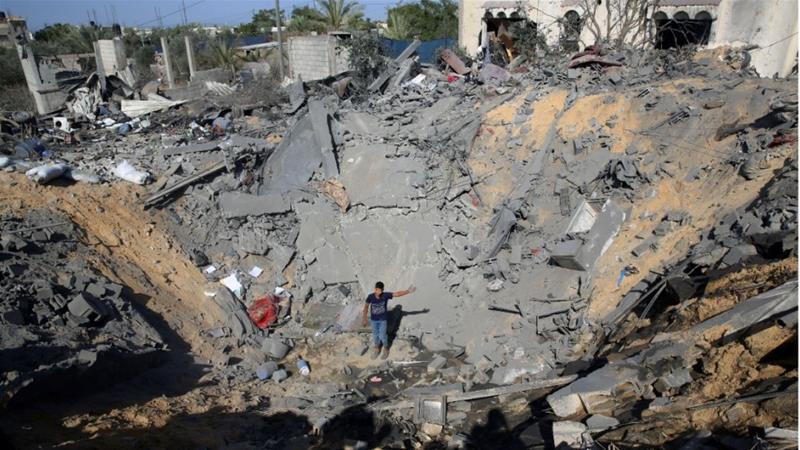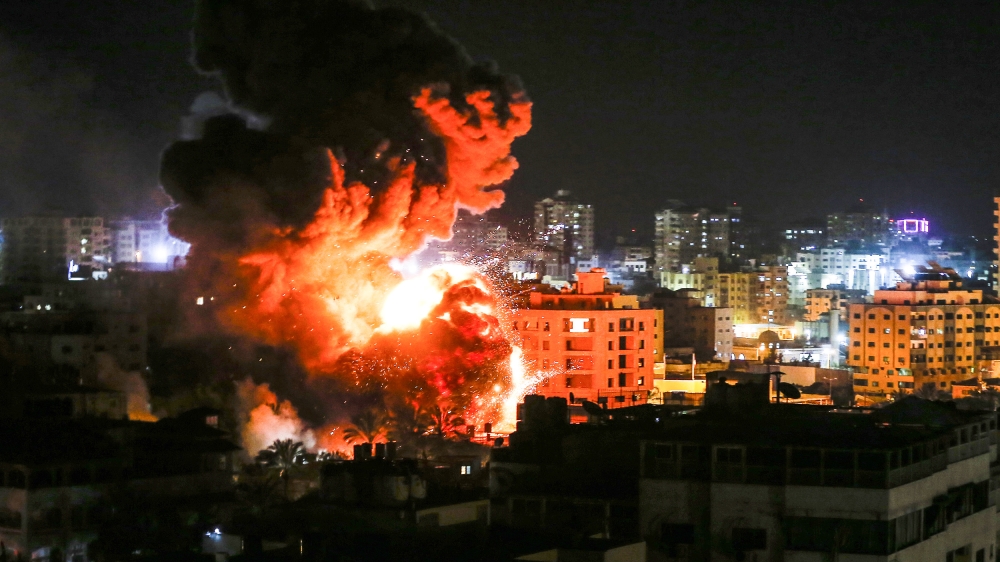www.aljazeerah.info
Opinion Editorials, January 2020
Archives
Mission & Name
Conflict Terminology
Editorials
Gaza Holocaust
Gulf War
Isdood
Islam
News
News Photos
Opinion Editorials
US Foreign Policy (Dr. El-Najjar's Articles)
www.aljazeerah.info
Christianity Meltdown in its own Birthplace? Western Churches Ignore multiple Warnings By Stuart Littlewood Redress, January 2, 2020 |
 |
 |
 |
| Site of an Israeli missile strike on a Palestinian home in Khan Younis, on November 16, 2019 | An Israeli air strike on Gaza City, on March 25, 2019 |
Ten years ago a group of Christian Palestinians issued “a cry of hope in the absence of all hope”, reflecting their country’s decades of suffering under brutal Israeli occupation. They said they hadreached a dead end in the tragedy of the Palestinian people because international decision-makers contented themselves with “managing” the crisis rather than solving it.
The situation was, and still is, destroying human life and that must surely be of concern to the church. “We call out as Christians and as Palestinians to our religious and political leaders, to our Palestinian society and to the Israeli society, to the international community, and to our Christian brothers and sisters in the churches around the world.”
Questions were repeatedly asked but never answered: What is the international community doing? What are the political leaders in Palestine, in Israel and in the Arab world doing? And what is the worldwide church doing about this?
What exactly is the problem?
The Kairos document included a long list of key issues which described the appalling situation. This is a bullet-point summary:
- Talk about a Middle East peace process remains just that: talk. In the meantime the people of the Holy Land have to put up with Israel’s brutal military occupation and everything that flows from it.
- The “apartheid” wall erected by Israel on Palestinian territory has separated towns and villages and turned them into scattered prison cantons. Gaza continues to live in inhuman conditions, under permanent blockade and cut off from the other Palestinian territories.
- Israeli squatter-settlements blight the land and steal natural resources, including water and agriculture, depriving hundreds of thousands of Palestinians and constituting an obstacle to any political solution.
- Reality is the daily humiliation at the military checkpoints, as Palestinians make their way to work, school or hospital.
- Reality is the separation of families especially where one of the spouses does not have an Israeli identity card.
- Religious liberty is severely restricted. Jerusalem and its holy places are out of bounds for many Christians and Muslims from the West Bank and Gaza on the pretext of security. Even Jerusalemites face restrictions during religious festivals. Some Arab clergy are regularly barred from entering Jerusalem.
- Refugees are also part of the reality. Most of them still live in camps in difficult circumstances, waiting for their right of return, generation after generation.
- The thousands of prisoners who are languishing in Israeli prisons are part of Palestine’s reality. When will they have their freedom?
- Jerusalem, the Holy City, continues to be emptied of its Palestinian citizens, Christian and Muslim. Their identity cards are confiscated, which means losing their right to reside in Jerusalem. Their homes are demolished or expropriated.
- Israeli contempt for international law and UN resolutions is central to the reality. The Arab world and the international community are paralysed despite critical reports by local and international human rights’ organisations.
- Palestinians within the State of Israel suffer discrimination. They too are waiting for equal rights that never come.
- Emigration is another reality. The likelihood of peace or freedom is so slim that it pushes young people, both Muslim and Christian, to emigrate. Thus the land is deprived of its most important resource – educated youth.
- Israel claims its actions are necessary for self-defence, using collective punishment and many other forms of reprisals against the Palestinians.
- Palestinians have tried negotiating but that didn’t advance the peace process.
- Some political parties opted for armed resistance, but Israel used it to accuse the Palestinians of terrorism and distorted the real nature of the conflict, pretending it is an Israeli war against terror when it’s actually an illegal Israeli occupation met by lawful resistance. The roots of “terrorism” are in the injustice and evil of the occupation. The people of Israel are urged to become partners in peace and abandon the cycle of endless violence.
- Biblical promises are interpreted in such a way as to deny Palestinians their rights and to threaten their very existence in their own homeland. Those theologians must reflect deeper on the word of God and revise their interpretations.
- Palestinians’ connectedness to this land is a natural right. Yet they are regarded by Israel as enemies for wishing to live as free people in their own land.
- They declare that the Israeli occupation of Palestinian land is a sin against God and humanity and that any distortion of the Bible or faith or history that legitimizes the occupation is far from Christian teaching.
- High-sounding initiatives, conferences, visits and negotiations have changed nothing. The Israeli attitude, refusing any solution, leaves no reason to suppose there’ll be an improvement anytime soon.
- The Israeli occupation is an evil that must be removed. Responsibility for this rests first with the Palestinians suffering the occupation. It lies also with the international community because international law regulates relations between peoples today. But ultimately the perpetrators of this injustice are responsible; they must free themselves from the evil that is in them.
- Christian resistance is a right and a duty. But it is resistance with love and must find ways that engage the humanity of the enemy.
- And Palestinian Christians choose to resist peacefully. Civil society, as well as international organisations, non-governmental organisations and certain religious institutions call on individuals, companies and states to engage in disinvestment and to boycott everything produced by the occupation.
- Palestinians ask their Muslim brothers to reject fanaticism and extremism. And they say to the world that Muslims are not to be stereotyped as the enemy nor caricatured as terrorists but rather to be lived with in peace and engaged with in dialogue.
- They say to the Jews that they can organise their political life, with all its complexity, once the occupation is ended and justice is done. It is not permitted to hate, or to kill or be killed. The culture of love is the culture of accepting others.
- They say to the churches of the world, please review fundamentalist attitudes and stop theological cover-ups that perpetuate the occupation and the injustice. They call on world churches to tell the unvarnished truth about the Israeli occupation. They ask: Are you able to help us get our freedom back?
- Palestinians see boycott and disinvestment as non-violent tools for bringing about justice, peace and security.
- And they say to the international community, end your “double standards” and implement the international resolutions intended to resolve the Israel-Palestine problem, otherwise we’ll all find ourselves vulnerable to the law of the jungle. Economic sanctions and boycott against Israel are now necessary if a just and definitive peace is to be reached and order restored to the region.
It’s a serious grumble-sheet which perfectly matches my own observations during visits there.
“Beyond urgent”
Eight years later, in 2017, came an Open Letter from Christian Palestinians to the World Council of Churches and the ecumenical movement. It was a heart-rending cry for help from the National Coalition of Christian Organisations in Palestine (NCCOP) saying the situation for Palestinians was “beyond urgent”. churches there were asking churches everywhere to call things as they are… to tell the awful truth: that is, to recognise that Israel is an apartheid state in terms of international law and the UN reports which said so.
They were concerned that states and churches were still dealing with Israel on a business-as-usual basis and ignoring the criminal reality of the military occupation.
After all, the world’s churches had come together in opposition to apartheid in South Africa and helped to defeat it. Why hadn’t they done the same in Palestine?
And they asked the World Council of Churches to condemn the Balfour Declaration as unjust and prod the UK into apologising and compensating the Palestinian people for their losses.
Here is the link to the actual document. Its powerful message should have made genuine churchmen sit up. It reminded everyone that Palestinians were still suffering from 100 years of oppression, beginning with “the unjust and unlawful Balfour Declaration, intensified through the Nakba [ethnic cleansing and dispossession of Palestinians in 1948] and the influx of refugees, followed by the Israeli occupation of the West Bank, including East Jerusalem and Gaza and the fragmentation of our people and our land through policies of isolation and confiscation of land, and the building of Jewish-only settlements and the Apartheid Wall.
“We are still suffering because of one political declaration from a Western empire, based on a twisted theological premise.” It made the point that some churches and some Christian leaders actually supported the establishment of a colonial state on Palestinian land, disregarding the fact that the Palestinian people had lived there for centuries and were now expected to pay a hefty price for atrocities committed in Europe.
Now a third Red Alert “standing on the cliff-edge looking into an abyss”
Meeting in Bethlehem last month on the 10th anniversary of their first warning document, Kairos Palestine reached out to the world’s churches yet again, saying that life in Palestine had deteriorated even further under another decade of illegal occupation.
- “The oppression is more aggressive and brutal.”
- “Our imprisoned and besieged sisters and brothers in Gaza, non-violently gathered for the March of Return, were the targets of a bloody and deadly response.”
- “Settlements continue to expand.”
- “Threats to annex the Jordan Valley and the settlements themselves grow without a word of condemnation from the major powers.”
- “We are experiencing the continued dispossession of our land, our freedom and our human rights.”
- “Add to this, three more appalling developments:
– US recognition of Jerusalem as the capital of Israel;
– the US secretary of state’s announcement that the US government no longer deems West Bank settlements to be “inconsistent with international law”;
– and the State of Israel’s recent adoption of their Nation-State Law which clearly reveals that de facto apartheid has become de jure apartheid.”
- “The failure of the peace process is further evidence that the current status quo is unsustainable.”
The statement went on: “There are still many who use the Bible to justify the occupation and who unquestioningly support the State of Israel. And, for the most part, the global church is failing us. We are standing as if on the edge of a cliff, looking into an abyss.”
Their 2009 commitments have not changed. Sovereignty over the city of Jerusalem must be shared. They call again for us to take action and defend the rights of Palestinians and those who stand in solidarity with them, and to support all forms of creative and non-violent resistance, including BDS. We are to reject attempts to label this resistance anti-Semitic. Other points emphasised include:
- Theological arguments seeking to justify the privilege of one people over another must be condemned;
- Israel is an apartheid state in terms of international law, especially after passing its Nation State legislation, and we must insist that no-one has exclusive claims to any land because of religion, race and/or ethnicity.
- We should encourage church leaders and pilgrims to visit Bethlehem and other Palestinian communities through the Palestinian tourism sector and not bow to the narratives and itineraries promoted by the Israeli government and used as an instrument of the occupation.
“This is no time for shallow diplomacy”
The essential point of their 2017 Open Letter was that time had run out: it was beyond urgent. And it ended with these chilling words: “This could be our last chance to achieve a just peace. As a Palestinian Christian community, this could be our last opportunity to save the Christian presence in this land.” So did the efforts of these Palestinian clergy, Christ’s front-line troops who daily face hostility, abuse and physical danger, finally get through to our comfy Holy Joes here? Has the penny dropped that the wellspring of their faith, the birthplace of Jesus, is being stolen and may be lost for ever if Israel gets its way?
How has the World Council of Churches responded to those urgent pleas from Palestine? And did the message percolate down through the ranks? And have our spiritual leaders, those upstanding “men of the cloth”, been mobilising their troops?
They promised to study and analyse. “As we at the WCC consider our plans for 2018 and beyond, we want churches in Palestine to know that their perspective is heard and it is vitally important,” said the WCC’s general secretary. “We will continue with the same passionate spirit to work on specific objectives, strategies and partners for advocacy to end the occupation and to work for just peace in Palestine and Israel.”
The WCC’s Commission of the Churches on International Affairs had been asked to contribute a thorough analysis of the changing political landscapes and dynamics in the Holy Land with an eye to developing a more specific advocacy strategy that works through nations and organisations with significant influence.
The WCC also planned to “explore theological reflections, studies and projects that will bring a perspective on just peace in the Holy Land from all parts of the world”, and strengthen communication about the situation in Palestine so that it can “help churches and other ecumenical partners address their constituencies and governments in a more systematic way”. This includes developing guiding principles for responsible pilgrimages of justice and peace to the Holy Land.
And how is all this work coming along? Will the Palestinian churches, facing impasse and deadlock for so long, be impressed? They had pleaded: “We need brave women and men who are willing to stand in the forefront. This is no time for shallow diplomacy, Christians.”
Archbishop of Canterbury Justin Welby’s 2019 Ecumenical Christmas Letter doesn’t mention the dire situation in Palestine or the foul conditions in Bethlehem. Nor does his Christmas Day sermon. No sense of urgency there, then.
However, Colin Sinclair, Moderator of the General Assembly of the Church of Scotland had this to say:
So his mind is on the job.
Cardinal Vincent Nichols, Catholic Archbishop of Westminster, said:
Pope Francis went as far as saying that Christmas festivities could seem a charade.
These are fine words. But they tip-toe around the main issues. And where is the global action? Where is the leadership in this fightback?
Will there actually be a fightback?
The power of hope
Christianity sometimes has trouble telling right from wrong and doing something about it. The Holy Land is a case in point. Evil reigns there. Christianity across the world cowers. What would Christ say to that?
I know what Michel Sabbah says. He is a former Catholic Patriarch of Jerusalem, a courageous man who’s on the spot and one of the great heroes of the struggle.
Let’s hit the reset button!
Christians who cannot grasp what is really going on out there, and who don’t understand what’s needed to stop it, might find Robert Cohen’s excellent article “Brace Yourselves for Costly Palestinian Solidarity” helpful in pointing towards proper, meaningful action.
Central to the problem is the so-called Ecumenical Deal, a reluctance to question Jewish support for Israel for fear of unpicking decades of interfaith reconciliation following the holocaust. We appear to have cast ourselves in the self-defeating role of repenting for age-old Christian anti-Jewishness. Breaking out of it and criticising Israel would be seen as a re-emergence of that anti-Jewishness. Does anyone inside or outside the bubble of the church seriously buy into this repentance stuff?
Besides, any re-emergence of anti-Jewishness is more likely to be caused by continuing failure on the part of Jewish leaders to condemn the cruel policies of the Israeli regime, aka “the Jewish State”, against Christian and Muslim communities.
Christians in Palestine, says Cohen, despair of our church leaders’ endless hiding behind the cover of political neutrality and their unwillingness to offend their religious dialogue partners. Consequently, he predicts, Jewish-Christian dialogue “is about to go through the wringer”. And he explains why it needs resetting.
Pressing the reset button means “refusing to allow your local Jewish communal leadership to set the boundaries of permissible debate on Israel”. It also means listening to the Christian voice under occupation before accepting the Jewish voice living comfortably, with full equal rights, many thousands of miles away from the Holy Land conflict zone.
Operating the wringer, of course, will be followed by a distinct chill forcing church leaders, local ministers and their congregations, as well as the Jewish leaders they have dialogue with, out of their comfort zone. Good. As Rebecca Vilkomerson, Jewish Voice for Peace, wrote in Haaretz, it is time for Jewish communities “to have some really uncomfortable conversations”.
Pressing the Reset button seems a useful move.
Postscript
On the morning of 30 December, on the BBC Radio 4’s Today programme, I heard the president of the Board of Deputies of British Jews say that the rise in anti-Semitism is a global disease that needs a global response. It didn’t occur to her, apparently, that much of the problem is explained by Israel’s cruel treatment of its Arab neighbours, especially the Palestinians. Wiser heads in Israel have warned for decades that Jews throughout the world would suffer for Israel’s appalling misconduct. So, it’s actually a local problem needing a local remedy.
***
Share the link of this article with your facebook friends
|
|
|
|
||
|
||||||


